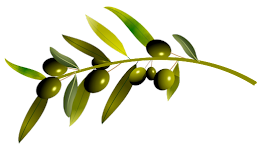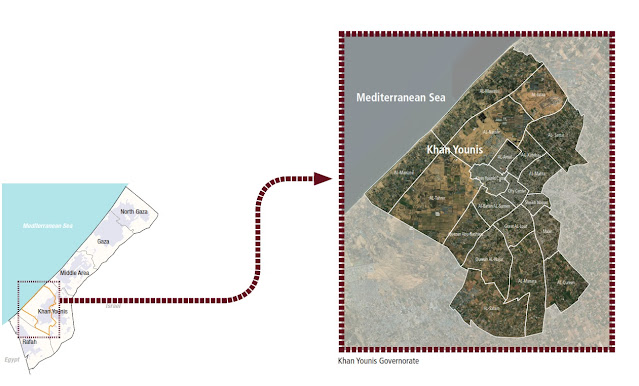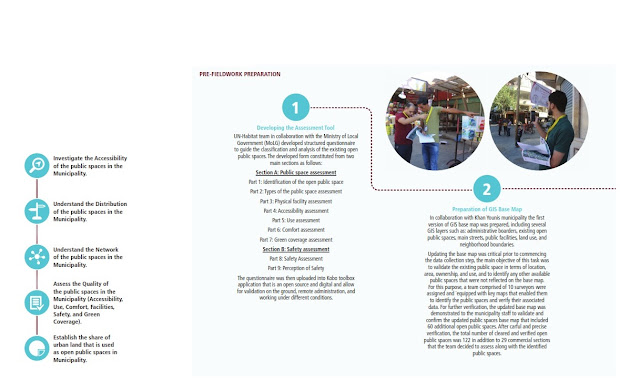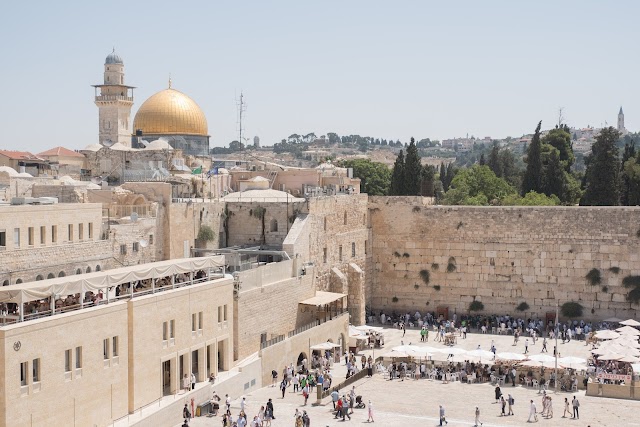Extension AND
Concentration: KHAN YOUNIS
Khan Yunis
similarly spelled Khan Younis or Khan Yunus; translation: Caravansary (Jonah)
is a city in the southern Gaza Strip. According to the Palestinian Focal
Department of Measurements, Khan Yunis had a general population of 142,637 out
of 2007 and 202,000 out of 2010 and 350,000 of each 2012. Khan Yunis, which
lies only 4 kilometers (around 2.5 miles) east of the Mediterranean Ocean, has
a semi-dried climate with temperature of 30 degrees Celsius most outrageous in
summer and 10 degrees Celsius most noteworthy in winter, with a yearly
precipitation of approximately 260 mm (10.2 in).
The Electorate of
Khan Yunis had five people on the Palestinian Administrative Board. Following
the 2006 Palestinian authority political race, there were three Hamas people,
including Yunis al-Astal; and two Fatah people, including Mohammed Dahlan. The
city is by and by under the Hamas association of Gaza.
By and large, the
city of Khan Younis worked as a station for business troops. It acquired unique
importance for its essential area interfacing the Nile Valley to the Fruitful
Sickle, Egypt, and the Middle Eastern Landmass. The khan filled in as resting
stop for dispatches of the barid, the Mamluk postal association in Palestine
and Syria. Close to the completion of the nineteenth century the Ottomans
spread out a common board to coordinate the issues of Khan Younis, which had
turned into the second biggest town in the Gaza Strip after Gaza itself.
The city's name is
framed of two words - Khan meaning lodging and Younis, which alludes to Ruler
Younis Dawadar (who was the leader secretary, one of the great positioning
authorities of the Mamluk ruler Barquq) who constructed a post in 1387 for
troopers monitoring voyagers and explorers while heading to Jerusalem and
Mecca. The khan and the creating town enveloping it were named "Khan
Younis" after him. The town square is lined by this great notable post
that rules the view.
GEOGRAPHIC AND
Segment Highlights
Khan Younis Region
is a piece of the eastern bank of the Mediterranean Ocean, 25 kilometers south
of Gaza and is viewed as the focal point of Khan Younis Governorate (Figure 7).
It is situated on the cross of scope 31.212 north and longitude 34.18 east, and
it is abutted by Rafah city from the south, Al Qarara city from the north,
eastern towns from the east, and the Mediterranean Ocean from the west. With
respect to area in Palestine, Khan Younis City is on the far south west of
Palestine, 15 kilometers north of the Egyptian lines, and 4 kilometers from the
Mediterranean Ocean and it is 50 m above ocean level. The absolute region of
the city is 54.5 km², it is the greatest city as far as region in the Gaza
Strip and it is the second biggest city concerning populace after Gaza City.
PCBS populace
assessment (2013) showed that Khan Younis Governorate's populace arrived at
369,048 occupants. Khan Younis governorate is boarded from the north by Deir
al-Balah, from the south by Rafah, from the east by the green line, and the
Mediterranean Ocean toward the west. Khan Younis is viewed as the biggest city
as far as region and its populace address one fifth of the absolute populace of
Gaza Strip (Alastal, et al., 2019). Khan Younis Governorate region is around
116 square kilometers, which addresses 30.59% of Gaza Strip region. Khan Yunis
Governorate incorporates various towns; Bani Sohaella, Abassan Kabera, Abassan
Jadida, Khozaa, AL-Qarara and AL-Foukhariy. Khan Yunis city district
incorporates (Downtown, Camp, AL-Amal, AL-Baten AL-Samen, AL-Mahta, AL-Kateba,
AL-Sattar, Quezan AL-Najar, Quezan Abu-Rashwn, Sheik Nasser, Maan, AL-Jalaa,
AL-Tahreer, AL-Mawassi, AL-Nasser, AL-Salam, AL-Manara, Goret AL-Oaf and
AL-Qureen).
The number of
inhabitants in Khan Younis was 351,934 toward the finish of 2016 (PCBS, 2017).
As per the Palestinian Focal Department of Measurements, Khan Younis had a
populace of 142,637 of every 2007 with a development pace of (4.23%) and
202,000 out of 2010. It addresses 19% of the Gaza Strip complete populace. The
number, as per an authority enumeration in 1922 during the English order, was
almost 3890 occupants, and afterward it expanded to
7248 of every 1931.
The development rate between censuses 1922 and 1931 was 76% with yearly
development assessed by 7%. In 1946, populace was around 12350 live on an area
of 2.5 km² in that time. Accordingly, the populace in 1946 assessed by 4940 for
each km², and it was exceptionally oncentrated on the downtown area around
Barqoq Palace.
After 1948 the
Nakba, wherein Israeli soldiers involved Palestinian regions and a considerable
lot of residents were removed from their territories to Gaza Strip, the UNRWA
laid out displaced people's camp in the northern western side of Khan Younis
city, on sand slopes between the city and the beach. The camp incorporates
blend of exiles who left their unique grounds and got comfortable Khan Younis
and it is worth focusing on that the populace conveyance in the camp region
depends on the town of beginning.
Financial
Perspectives
Foundation in Khan
Younis city faces many difficulties regarding water, sterilization, power,
wellbeing, and schooling. Others are similar to entertainment and backing
districts, the continued with plan of organizations to residents because of the
barricade, absence of subsidizing as well as expanded strain on assets. Speedy
people improvement and limited land resources achieve an incredibly high and
growing people thickness.
Khan Younis is the
second biggest metropolitan region in the Gaza Strip after Gaza City. Starting
around 2012 Khan Younis had the most noteworthy joblessness rate in the
Palestinian domains. The town turned into a significant community for exchange
and its week after week Thursday market drew merchants from adjoining locales.
Khan Younis is a market town for rural produce from the encompassing towns. It
fills in as the chief market focus of the southern region's southern half and
hosts a week after week Bedouin souk ("outside market") generally
including neighborhood wares. Thus, it merits a visit on Wednesdays and
Thursdays during the week by week, vivid Bedouin Market, where shippers offer
everything from weaving to fish. There likewise are a few bistros around the
town community where guests can plunk down to eat nearby food or taste Arabic
espresso.
The complete region
of the governorate is (116 Km2 ), however metropolitan specialists reach (97.8
Km2 ). The developed region in Khan Younis is (37.3 Km2 ), where (10.7 Km2 )
are developed through green houses, notwithstanding (13.7 Km2 ) are committed
to occasional harvests in grain open fields and (12.9 Km2 ) are devoted to
fructification development. This truly intends that (38.12%) of Khan Younis
civil specialists regions are developed land region and (32.16%) of the
complete governorate regions are developed land. Also, around (18.1 Km2) are
arable grounds. Khan Younis governorate ground breaking strategy for 2013
distinguished developed area of (23,000) dounms, which addresses (23%) of the all-out
end-all strategy region, contrasted with (950) dounms which are committed to
modern and business use and addressing around (1%) of the complete ground
breaking strategy region.
Goals OF THE OPEN
PUBLIC SPACE Evaluation IN KHAN YOUNIS
The stock and
appraisal of Open Public Spaces in Khan Younis City was done with an expect to:
The aftereffects of the evaluation will illuminate key and strategy proposals,
especially to further develop wellbeing and security, availability and
consideration for ladies and young ladies.
Activating THE
Appraisal Group
UN-Environment doled
out a public specialist - metropolitan arranging master - to help in leading
far reaching public space evaluations, with a particular spotlight on giving
protected, comprehensive and open public space for ladies and young ladies,
particularly in the most burdened networks. The expert is dependable to lead
and work with the security review overview in Khan Younis City and to examine
and introduce the discoveries from the appraisal to the key partners. The group
was comprised of 20 people living in Khan Younis city, chose in participation
with Khan Younis region, and drawn from different foundations. The chose
colleagues were chosen in view of their related knowledge in directing field
appraisals inside the Khan Younis city, this was visualized to work with exploring
the nearby scene as they are proficient about the designated areas.






0 Comments
if you have any doubts, please let me know.